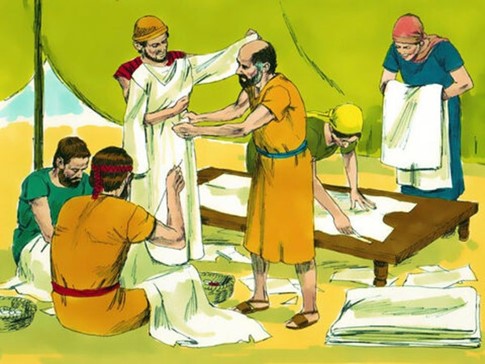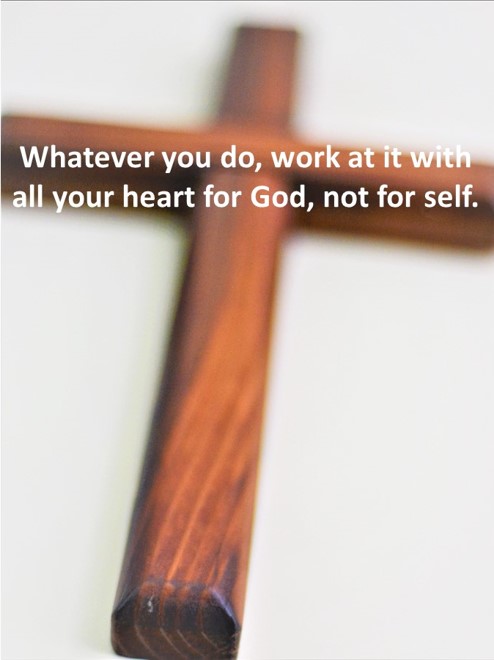Good morning!
Greetings in the name of the Father, the Son, and the Holy Spirit.
“Each of you should use whatever gift you have received to serve others, as faithful stewards of God’s grace in its various forms.” (1 Peter 4:10)

In a world that often measures worth by accomplishment, the story of Bezalel and Oholiab in Exodus 35 presents a refreshingly different perspective. This narrative doesn’t spotlight kings or warriors; instead, it celebrates craftsmen—ordinary individuals touched by the divine.
Dive into today’s culture, and you’ll find a fascination with the “self-made” narrative. Success stories are often framed around individuals who climb the ladder of achievement, often driven by talent and tenacity. But how often do we pause to consider the source of these talents? Where do they truly originate?
Enter Exodus 35. Here, we’re introduced to two artisans, not through a lens of self-accomplishment, but as recipients of God-given skills. Their talents, diverse and distinctive, were bestowed upon them by none other than the Creator Himself. The emphasis isn’t on their personal prowess but on a divine purpose—a purpose that extends beyond mere artistry.
As we unpack this chapter, we’re invited to reevaluate our perceptions of skill and success. We’re beckoned to recognize that every gift, every talent, has a divine imprint. And just like Bezalel and Oholiab, each of us carries within a unique calling—a blend of skills intended not just for our advancement, but for a purpose that resonates with eternity.
So, let’s journey together, delving into this biblical account, and discover the profound significance of craftsmanship, all divinely orchestrated for God’s glory.

Recognizing Bezalel and Oholiab: Ordinary Men Endowed with Divine Gifts for a Divine Purpose
In a time when names were synonymous with destiny, Bezalel and Oholiab might not have been household names like Moses or Aaron. Their fame did not come from parting seas or leading rebellions, but from their hands, their art, and their divine anointing in craftsmanship. They were the unsung heroes of the Tabernacle, whose contributions were crucial to the creation of a sacred space where God would meet His people.
The beauty of their story lies not just in their unique talents but in the way God handpicked them for His purposes. Exodus 35:30-31 proclaims, “Then Moses said to the Israelites, ‘See, the Lord has chosen Bezalel son of Uri, the son of Hur, of the tribe of Judah, and he has filled him with the Spirit of God, with wisdom, with understanding, with knowledge and with all kinds of skills.'” Oholiab, too, was singled out as an inspired artisan from the tribe of Dan. Their selection wasn’t a random decision; it was a divine appointment.
It’s easy to overlook the gravity of this. Here were two ordinary men from different tribes, not of Levitical or priestly descent, yet chosen to play a pivotal role in God’s plan. They weren’t just artists; they were instruments in the hands of the Master Craftsman. They were chosen to construct a space that would be the epicenter of worship, where heaven met earth.
Now, consider the enormity of their task. The Tabernacle wasn’t just another structure; it was a tangible representation of God’s presence among His people. Every thread woven, every metal forged, every stone set had to reflect the majesty and beauty of the Almighty. This was no ordinary commission. It demanded excellence, precision, and, above all, a heart aligned with God.
And that’s where the true beauty of Bezalel and Oholiab’s story lies. God didn’t choose them solely because of their skills but because He had endowed them with His Spirit. Their craftsmanship was infused with divine inspiration. They didn’t just create; they worshiped through their creation. Their tools and materials were channels through which God’s glory shone forth. Each stroke, cut, and design was a testament to a partnership between the Creator and His creation.
It is also noteworthy to remember that in a culture where significance was often tied to one’s tribal lineage or heroic acts, Bezalel and Oholiab’s legacy was their craftsmanship. Their narrative shatters any misconception that only those in the limelight have significant roles in God’s kingdom. They remind us that God sees and values the hidden talents, the behind-the-scenes contributors, and the unsung heroes.
In their story, we find an echo of our own longing to be used by God, to find purpose and significance. Whether we are artists, writers, homemakers, engineers, or any other profession, the narrative of Bezalel and Oholiab reminds us that when our skills meet God’s purpose, extraordinary things can happen. Their legacy is a clarion call to every believer: Our talents, no matter how insignificant they might seem, have a divine purpose. In God’s grand tapestry, every thread counts, every color matters, and every stroke paints His eternal story.

The Importance of Every Role in Building the Tabernacle: From Those Who Worked with Precious Stones to Those Who Sewed Fabrics
The Tabernacle, often referred to as the Tent of Meeting, was not just another ancient structure; it was the epicenter of God’s presence among His people. Constructing this revered edifice demanded not just labor but love, not just manpower but divine mandate. And while Bezalel and Oholiab stood as key figures in its construction, the assembly of the Tabernacle was a collective endeavor, drawing on the varied skills of numerous individuals.
Each aspect of the Tabernacle had symbolic and spiritual significance. It was a colossal undertaking that required a vast array of materials: gold, silver, bronze, blue and purple and scarlet yarns, fine twined linen, goats’ hair, tanned rams’ skins, goatskins, acacia wood, oil for the light, spices for anointing oil and for fragrant incense, onyx stones, and stones for setting (Exodus 25:3-7). This diverse list underscores the myriad of talents and trades needed to complete this monumental task.
Firstly, let’s consider those who worked with precious metals and stones. These craftsmen had the intricate task of molding and shaping materials into the Ark of the Covenant, the Table for the Bread of the Presence, the golden lampstand, and various other items. Theirs was the challenge of ensuring each item was not only functional but also a fitting tribute to the God of the universe. Every piece had to be perfect, reflecting the glory and majesty of Jehovah. In these craftsmen, we see the dedication to detail, patience, and a deep reverence for their task.
In stark contrast, yet of equal importance, were those who worked with fabrics. The Tabernacle required curtains of finely twisted linen and blue, purple, and scarlet yarn, with cherubim woven into them by a skilled worker (Exodus 26:1). These curtains would separate the Holy Place from the Most Holy Place. The hands that wove these fabrics were not just creating barriers but divine partitions, set to distinguish the very space where God would dwell. The fabrics used had to be durable, beautiful, and, most importantly, made with a heart of worship.
But the beauty of this construction process goes even beyond the materials. Think about those who had the responsibility of assembling and disassembling the Tabernacle, as the Israelites journeyed through the wilderness. Their roles might not have been as glamorous as those who worked directly on the Tabernacle’s sacred objects, but their importance cannot be understated. They ensured the sanctity and safety of the Tabernacle, treating every beam, every peg, every fabric with utmost reverence.
When we delve deeper into the narrative of the Tabernacle’s construction, we find another profound layer. Exodus 35:21 says, “And they came, everyone whose heart stirred him, and everyone whose spirit moved him, and brought the Lord’s contribution to be used for the tent of meeting…” This was a communal effort, powered by willing hearts. It wasn’t just about physical contributions but also about a community coming together, unified in their purpose and passion.
This assembly process serves as a poignant reminder for all believers. Every person, regardless of their role, held pivotal importance. There were no insignificant tasks in the Tabernacle’s construction. Every hammering sound, every woven thread, every polished stone echoed a collective worship, a communal adoration for the Almighty.
In this story, we are reminded of Paul’s words in 1 Corinthians 12:12-14, “For just as the body is one and has many members, and all the members of the body, though many, are one body, so it is with Christ… For the body does not consist of one member but of many.” Whether a goldsmith or a weaver, every individual played their part in the divine tapestry of the Tabernacle, highlighting the beauty of unity in diversity.
Applying to Today’s Context: Understanding That Every Talent Is from God and Should Be Used for His Glory, and Recognizing the Importance of Every Role Within the Church Community
As we transport the lessons from Exodus into our contemporary era, the narrative of the Tabernacle construction offers a timeless lesson about the value of every individual’s contribution within the church community. The ancient blueprint becomes a metaphor for the modern church, reminding us that each person, with their unique gifts, has a divine role to play in the grand design of God’s kingdom.
1 Peter 4:10 asserts, “Each of you should use whatever gift you have received to serve others, as faithful stewards of God’s grace in its various forms.” We often think of spiritual gifts as being limited to teaching or preaching. However, much like the varied talents employed in the Tabernacle’s construction, the church community is enriched by diverse gifts. Some might be gifted in music, others in administration, hospitality, counseling, or evangelism. Regardless of the nature of the gift, its source is divine, and its purpose is to edify the body of Christ and glorify God.
In today’s world, there’s a temptation to rank and compare our gifts with others. This competitive spirit, fueled by societal metrics of success, can infiltrate the church, leading individuals to either pridefully flaunt their gifts or, conversely, feel their offerings are too insignificant for God’s work. But Paul, in his wisdom, addressed this very sentiment in 1 Corinthians 12:15-16, “If the foot should say, ‘Because I am not a hand, I do not belong to the body,’ that would not make it any less a part of the body. And if the ear should say, ‘Because I am not an eye, I do not belong to the body,’ that would not make it any less a part of the body.”
Every role, every talent, and every gift, no matter how visible or hidden, is invaluable in the eyes of God. The church choir needs both the lead singers and those harmonizing in the background. The church event needs both the planners and those ensuring everything runs smoothly behind the scenes. The Sunday school thrives with both teachers and assistants. In essence, every act of service, no matter how small, contributes to the larger mission of the church.
Moreover, it’s essential to understand that our gifts are not just for personal gratification. James 1:17 reminds us, “Every good gift and every perfect gift is from above, coming down from the Father of lights.” Thus, our talents are on loan from God, entrusted to us for a season to be used for His glory.
In the context of the modern church, there is a pressing need for unity, understanding, and appreciation. The church thrives when its members recognize the importance of each individual’s contribution and encourage one another to serve with willing hearts, just as the Israelites did during the Tabernacle’s construction.
Furthermore, in a society where individualism is often celebrated, the church stands as a beacon of collective purpose. Our individual gifts, when combined, create a symphony of worship, outreach, love, and service. We are the body of Christ, and as Paul so eloquently expressed in 1 Corinthians 12:27, “Now you are the body of Christ, and each one of you is a part of it.”
In conclusion, as we reflect on the narrative of the Tabernacle and its applicability to our lives, let us remember to value every gift, cherish every contribution, and continually seek ways to use our talents, resources, and time for the expansion of God’s kingdom and His glory.
Conclusion & Life Application
In conclusion, the intricate tapestry woven through the accounts of Bezalel, Oholiab, and the meticulous crafting of the Tabernacle beckons us to a deeper understanding of the sanctity of our God-given abilities. These narratives paint a vivid picture of God’s intricate design, wherein every individual’s skill, no matter its nature or magnitude, forms an essential thread in the grand design of His purpose.
Our talents, often regarded as personal assets or markers of identity, carry a loftier significance. They are divine endowments, lovingly bestowed upon us by our Creator. They aren’t just for personal development or societal contribution but are spiritual tools meant to serve a Kingdom far grander than earthly realms.
In light of this, let’s pivot our perspective. Let’s not merely see our abilities as paths to success or accolades. Instead, envision them as sacred instruments, purposed for divine assignments. Let’s foster a heart that seeks to serve, to uplift, and to glorify, harnessing our talents to edify the church, enrich our communities, and illuminate God’s love in every corner of our world.
In our daily endeavors, as we employ our skills and navigate our roles, may our central refrain resonate with the profound humility and dedication expressed by the psalmist: “Not to us, LORD, not to us but to your name be the glory, because of your love and faithfulness” (Psalm 115:1). Let this be the anthem of our hearts, the guiding principle behind every action, every talent employed, every life touched.

Whatever you do, work at it with all your heart, as working for the Lord, not for human masters, since you know that you will receive an inheritance from the Lord as a reward. It is the Lord Christ you are serving. (Colossians 3:23-24)
